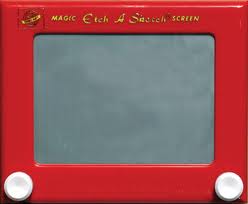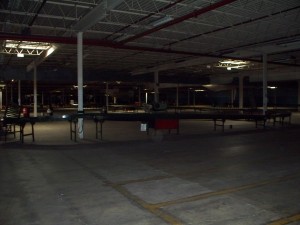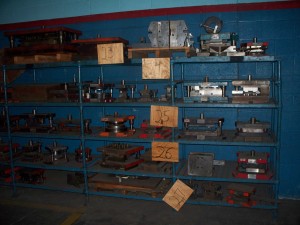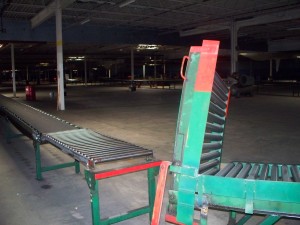Exporting Fun
Here in 2010, everyone knows that it’s becoming more and more common for the United States to export jobs to countries where the labor is cheaper in cost.
Locally, my area used to be well known for producing no less than three types of goods: automotive products, toys, and candy. Because of the free-falling economy and other things, the demand in the automotive industry has plummeted, and I don’t have a desire to go into further detail about that in this blog post. Fortunately, all seems to be well in our local candy factory, and the sugary sweet aromas still float upon our breezes every day. But much like many of our automotive-oriented factories, business at the local toy factory is not going so well. What once was a thriving complex of bustling office buildings, manufacturing facilities, and distribution warehouses crisscrossed with train tracks and semi trailers for shipping has become an almost ghostly graveyard of quiet emptiness.
Recently, I had the opportunity to glimpse the inside of one of the old manufacturing facilities for a company called Ohio Art, who is probably best known for creating the timeless toy (or so it was once thought to be) – the Etch-A-Sketch.
Who can blame a struggling company for trying to cut costs just to stay above water, and Ohio Art cut its costs (and almost a hundred jobs) about 10 years ago when they moved their production lines to China. Now the sprawling complex, split down the middle by the aptly named “Toy Street”, sits mostly empty with the company leasing some of the large space to other companies while other areas are used by local organizations. I couldn’t resist the opportunity to snap a few pictures, especially for those of you who are ghost hunters. I’m not really inclined to believe in paranormal phenomena, but for the two days I worked in the abandoned Ohio Art warehouse, I could have convinced myself that we humans were not alone. Beyond the creepiness that comes from being in a humongous (and I mean HUMONGOUS) abandoned manufacturing facility, there were plenty of strange noises: creaking, clanking, dripping, whooshing, you name it. There were random tickles on my arm, brushes on my back, and taps on my shoulders (many of which were later attributed to rogue cobwebs and the like, but those explanations ruin my ghost story don’t they). Not only that, but when production was moved across the globe to China, many old machines, mechanical parts, and things like employee safety signs were left behind, seemingly testaments to the millions of toys that were birthed here and long forgotten.
The emptiness of Ohio Art is a sad thing; not only for the surrounding community who lost all those jobs and for the executives who had to make those tough decisions, but also as a sign of our country’s fledgling economy. If you’d like to read more about how Ohio Art’s production line was moved to China (and about how conditions aren’t always what they seem for Chinese workers), I found the following article pretty interesting, and you might also:
Ruse in Toyland: Chinese Workers’ Hidden Woe
By JOSEPH KAHN
Published: December 7, 2003SHENZHEN, China— Workers at Kin Ki Industrial, a leading Chinese toy maker, make a decent salary, rarely work nights or weekends and often ”hang out along the street, play Ping-Pong and watch TV.”
They all have work contracts, pensions and medical benefits. The factory canteen offers tasty food. The dormitories are comfortable.
These are the official working conditions at Kin Ki as they are described on paper — crib sheets — handed to workers just before inspections.
Those occur when big American clients, like the Ohio company that uses Kin Ki to produce the iconic toy Etch A Sketch, visit to make sure that the factory has good labor standards.
Real-world Kin Ki employees, mostly teenage migrants from internal provinces, say they work many more hours and earn about 40 percent less than the company claims. They sleep head-to-toe in tiny rooms. They staged two strikes recently demanding they get paid closer to the legal minimum wage.
Most do not have pensions, medical insurance or work contracts. The company’s crib sheet recommends if inspectors press to see such documents, workers should ”intentionally waste time and then say they can’t find them,” according to company memos provided to The New York Times by employees.
After first saying that Kin Ki strictly abides by all Chinese labor laws, Johnson Tao, a senior executive with the privately owned company, acknowledged that Kin Ki’s wages and benefits fell short of legal levels and vowed to address the issue soon.
He said that the memos might have reflected attempts by factory managers to deceive inspectors, but that such behavior ”did not have the support of senior management.”
William C. Killgallon, the chief executive of Ohio Art Company, the owner of Etch A Sketch, said that he considered Kin Ki executives honest and that he had no knowledge of labor problems there. But he said he intended to visit China soon to ”make sure they understand what we expect.”
Etch A Sketch is the same child’s drawing toy today that it was in 1960, when Ohio Art first produced it in Bryan, Ohio. But efforts to keep its selling price below $10 on shelves at Wal-Mart and Toys ”R” Us forced the company to move production to China three years ago.
Today the same toy is made not just for lower wages, but also under significantly harsher working conditions. Kin Ki’s workers, in fact, are struggling to obtain rights that their American predecessors at Ohio Art won early in the last century, though the workers are without the aid of independent unions, which remain illegal in China.
China now makes 80 percent of the toys sold in America, according to United States government figures, and no industry here has come under greater pressure to adhere to global labor codes. Kin Ki and most other big producers open their doors to foreign inspectors to assuage concerns that products used to entertain children in rich countries are not made under oppressive conditions in poor ones.
But that goal conflicts with price pressures in commodity industries like toys, where manufacturers command no premium for good labor practices. China alone has 8,000 toy makers competing fiercely for contracts by shaving pennies off production costs.
Kin Ki stays competitive, workers say, by paying them 24 cents an hour in Shenzhen, where the legal minimum wage is 33 cents. When the Etch A Sketch line shut down in Ohio just after the Christmas rush in 2000, wages for the unionized work force there had reached $9 an hour.
Chinese workers say the company also denies them legally required nonsalary benefits and compels them to work 84 hours a week, far more than the legal maximum, without required overtime pay.
”I keep this job because my parents and my daughter depend on the money I earn,” said one migrant worker, who if named could lose her position for talking about the company. ”No one likes to work in these conditions, but I have no choice.”
Etch A Sketch has had rare longevity in the toy world. Baby Boomers used them as children and now buy them for their own families by the millions.
The toy survived into the electronic age because of nostalgia and clever promotions. But its appeal has continued, in part, because it keeps getting cheaper to own. It sold for $3.99 when it was introduced. If it had kept pace with the consumer price index over its 43 years, it would retail for $23.69 today instead of $9.99.
Mr. Killgallon and his brother, Larry, who is president of Ohio Art, said in an interview that their efforts to reduce costs ran out of steam by the late 1990’s, in part because of soaring health care expenses.
The logic of overseas production grew irresistible, as wage rates and shipping costs fell and quality improved, they said. An Etch A Sketch made in China and delivered to the company’s warehouse in Bryan was found to cost 20 percent to 30 percent less than making it in Bryan. Moving the full line to China meant laying off about 100 people.
”We tried hard to make this work in Bryan,” Larry Killgallon said. ”But we looked at the numbers and we realized that we had to move.”
Since early 2001, Etch A Sketches have been made in the village of Da Kang, a dusty enclave on the outskirts of Shenzhen, near Hong Kong. Once a farm region, the area has been overtaken by white-tiled factories and itinerant laborers. Landlords scrawl their phone numbers on the walls of old farm homes, like commercial graffiti, for workers who want to rent rooms. The village planted roses and marigolds to beautify the roadside, but the fallout from factories and construction sites has colored them gray.
High walls surround Kin Ki’s production lines and warehouses. Dormitory windows are covered in chicken wire. Workers must enter and leave through the guarded front gate.
The factory, workers say, operates with the intensity of a military campaign. Production starts at 7:30 a.m., and, breaking only for lunch and dinner, continues until 10 p.m. Saturdays and Sundays are treated as normal workdays, so a work week consists of seven 12-hour days.
That far exceeds Shenzhen’s regulations. The authorities have set a 40-hour, five-day work week, like the United States. Local rules allow no more than 32 hours of overtime per month, which must be compensated by paying time and a half on weekdays and double time on weekends.
Kin Ki set a much lower pay scale, workers said. It pays just 1.3 times pay base for any overtime, weekday or weekend. Workers say their monthly paychecks would more than double, to about $200 from around $85, if the company paid legal wages.
The work itself can be draining and tedious. Unlike Ohio Art’s factory, Kin Ki uses few machines to offset manual labor, and it needs three or four times the number of workers casting plastic molds, painting parts, and attaching the strings and rods that operate the drawing mechanism of the Etch A Sketch. But Kin Ki workers say it is the pay, not the task, that upsets them.
”Most of us would work long hours willingly if we were paid according to the law,” said one employee. ”The way things are now, we can shut up or leave.”
Some workers took action against the factory last June and July, refusing to work unless the company raised wages. They also demanded that the daily diet of boiled vegetables, beans and rice be improved and supplemented more often with pork, fish or some other meat, which they say is served just twice a month.
The company responded by raising wages by a few cents a day, workers said. The canteen allotted each worker an extra dish each day, though no more meat.
But managers made ”fried squid” of two workers they singled out as strike leaders, workers said, using a popular term for dismissals.
The company acknowledged having significant labor problems. ”I know that I need to increase wages and to comply with the law,” Mr. Tao said. ”I have the intention of doing this and will raise all wages in 2004.”
He also acknowledged that workers had gone on strike. But he denied that Kin Ki had dismissed the two ringleaders. He said they ”were well known troublemakers” who left the factory of their own accord.
Whatever Kin Ki’s intentions are now, company documents show that it has been paying below-regulation wages — and seeking to fool foreign clients — for years.
One memo preparing workers and supervisors for an inspection in September 2001, urged workers to help the factory ”cope with clients.”
”Foreign clients made unattainable demands during previous inspections, including on limiting overtime,” the memo said. ”But when you think about it, you come from all over the country to make money, not to rest.”
A more recent memo, issued to prepare for an inspection that took place on Nov. 26, urged workers to memorize false numbers for wages and working hours to reflect Shenzhen’s regulations. The memo promised bonuses to workers who responded as directed when approached by inspectors.
Workers said the elaborate ruse had one happy result. Because few of the employees have legal work contracts on file, the factory must pretend that its work force is smaller than it is when inspectors visit. On such days most of the factory’s 850 workers get a rare treat: a day off.
On Nov. 26, with an inspection under way inside the plant, workers congregated in their rented homes or food stalls to eat, chat, smoke and gossip.
”I thank the inspectors for one thing,” said a Kin Ki worker from rural Sichuan. She was crouching over a bucket of cold water in the warm afternoon sun, washing her hair. ”I needed a rest,” she said.



